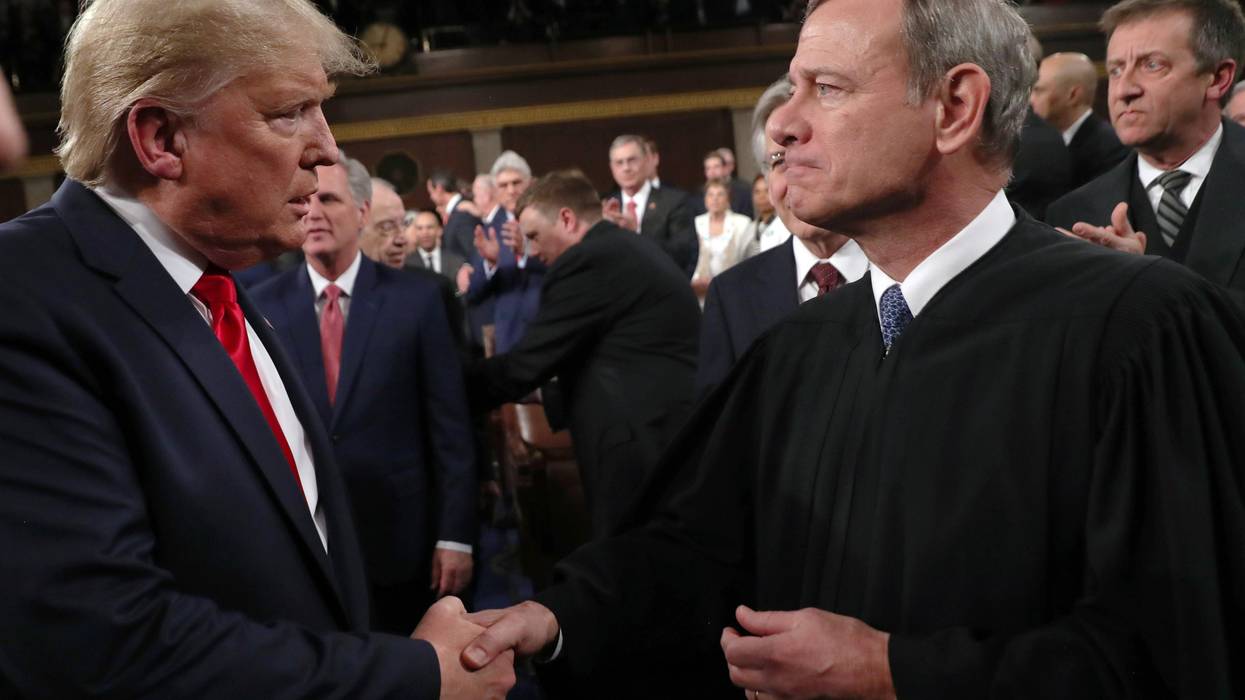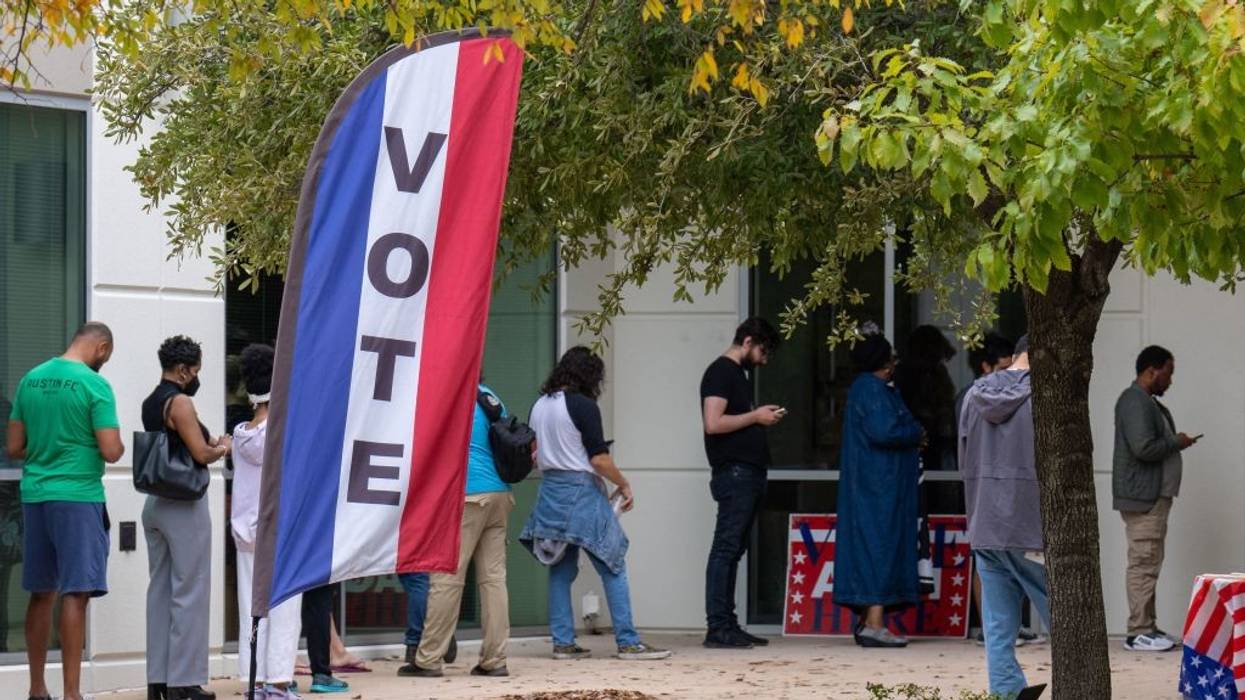The attacks on the rule of law are all intended to protect Trump and his accomplices from the legal consequences of their attempt to overthrow a free and fair election to steal the presidency through fraudulent and violent methods.
Insofar as the Supreme Court refuses to allow juries to even hear the evidence on whether Trump is innocent or guilty of such charged crimes, the court is also rejecting a government of laws in favor of a government of Trump.
On one front, essentially all Republican politicians now insist that Donald Trump can never be found guilty of any crime. Just as Trumpians take the de facto view that an election is only fair if Trump wins, so they now maintain a trial is only fair if Trump is acquitted. Practical translation: Trump is above the law.
On a second front, Trump’s ethically compromised allies in the Supreme Court have conveniently delayed his other criminal trials while they consider absurd legal theories designed to erase the criminal charges against him. The court’s right-wing majority could well decide to bestow impunity for the attack on the Capitol and the conspiracy to negate the Electoral College vote. Two justices who have signaled their support for the insurrection insist on sitting for these cases, undermining confidence in the courts and in the rule of law by their obvious bias.
Month after month, the criminal Trump has smeared every participant in the judicial process with lies and threats, in a vitriolic effort to intimidate judges, prosecutors, and jurors and to persuade the public that our courts are illegitimate.
Now, with the unanimous jury verdicts of guilt in the first of Trump’s four criminal cases, the Republican swarm has gone into a feeding frenzy.
Their goal: eradicating the very notion that their Great Leader can be subject to the law. Their methods: delegitimize the judicial system; menace everyone in the apparatus of law enforcement; and insinuate a violent response is needed.
Trump’s followers have taken up the call. MAGA threats flood social media, and nearly everyone involved in his prosecutions have been threatened.
“Someone in NY with nothing to lose needs to take care of [trial judge] Merchan,”
proposes one of Trump’s acolytes. “Judge needs a hatchet to the face,” says another. “I hope every juror is doxxed and they pay for what they have done,” yet another writes on Trump’s social media platform. “1,000,000 men (armed) need to go to Washington and hang everyone.”
Political violence commonly follows from Trump’s prompts. But even when it doesn’t, judges, jurors, and their family members live in fear. They are suffering because they worked to ensure that we are a society in which conflicts are resolved through courts and law, not vigilante savagery.
In this moment of crisis, the chief justice of the United States should be a champion of the rule of law, explaining that an independent judicial system is essential to a democracy and defending the integrity of the judge and jurors in Trump’s trial.
The chief justice should denounce the reckless GOP claims that the courts are “corrupt,” “rigged,” and “politicized,” and that President Joe Biden organized a giant witch hunt to silence Trump—all claims for which there is zero evidence. Above all, the chief justice should rebuke the calls for violence, explicit or tacit.
Chief Justice John Roberts actual response? Silence.
When the Republican Speaker of the House Mike Johnson suggests that his personal friends on the Supreme Court will surely “step in” to overturn the verdict, Chief Justice Roberts says not one word about the feverish, baseless attacks on the judicial branch of government.
When GOP House Judiciary Committee Chairman Jim Jordan
demands the prosecutors in Trump’s case appear at a hearing so he can berate them for the supposed “political prosecution” of Donald Trump, the chief justice ignores this direct assault on the separation of powers and the rule of law.
The chief justice did find time to try to deflect attention from the ethical calamity enveloping the Supreme Court. He was forced to because Justice Samuel Alito has joined Justice Clarence Thomas in shamelessly flouting long-standing canons of judicial ethics.
Justice Thomas simply ignores the fact that
his wife Ginni participated in the attempt to overthrow the 2020 election, an attempt that is about to come before the Supreme Court. No one can doubt that a judge in his position—if he participates in the case—might rule in favor of the insurgents in order to protect his wife from potential liability. That is why recusing himself is obviously required. But Thomas won’t.
Justice Alito’s effort to evade responsibility for open political partisanship is still less plausible.
No, Justice Alito, you cannot make the issue go away by claiming it was your wife alone who flew the flag of insurrection and you had nothing to do with it. When you live in a household with someone else, your partner does not display flags on your joint home unless the symbol represents both of your views. Especially when you’re a Supreme Court justice, whose manifest impartiality is a bedrock necessity. If that was not immediately obvious to her, then you tell her so and the flags come down.
In reality, blaming his wife was just an afterthought to give Alito a measure of deniability.
Since Justice Alito is not a total moron and since he does not live on Mars, he is also perfectly aware that Trump and his allies brought 60 lawsuits challenging the 2020 election, and that all of the cases—including cases presided over by many Trump-appointed judges—found no evidence of widespread fraud, no evidence the election was stolen. Which is to say: Justice Alito knows the entire “stop the steal” movement rests on a lie.
This means, too, that Justice Alito is personally aware that the flag flown at his home stands for a falsehood, one that threatens American constitutional democracy. Plainly, he cannot sit as an impartial judge of claims involving individuals who are charged with trying to overthrow the election based on that lie, when he has himself chosen to embrace the lie.
The chief justice’s response to Alito’s and Thomas’s refusal to recuse themselves: a shrug of his shoulders. Each justice makes his or her own decision on what is required by the Supreme Court’s belatedly adopted code of judicial ethics, says Roberts. Nothing more to say.
When Senate Judiciary Committee members invited him to discuss judicial ethics with them, Roberts refused, citing high principles. “Separation of powers concerns and the importance of preserving judicial independence counsel against such appearances.”
But the chief justice got it backwards.
The constitutional principle of the “separation of powers” among the legislative, executive, and judicial branches of government goes hand in hand with the related constitutional principle of “checks and balances.” This is the theory embraced by the Founding Fathers that representative government and the rule of law are protected when each branch of government is restrained by the powers of the other branches.
Under our Constitution, Congress—the legislative branch—was intended to possess powers to constrain and guide the judicial branch as well as the executive branch. Considering effective rules of ethics when the Supreme Court shuts its eyes to ethical problems is plainly within the congressional purview.
The judicial branch does have a duty to defend its independence, and it includes a duty to police assertions of power by those who would undermine it. Power outside the bounds of law, power without accountability, power that defies the will of the people, as expressed in free and fair elections, is the ultimate threat to the rule of law.
Founding Father John Adams famously urged in 1774 that ours be “a government of laws, and not of men.” Republicans who refuse to encompass the possibility of Trump being held responsible for criminal acts are saying that Donald Trump’s will must come first—that Trump’s wish to falsify business records, to possess government documents that don’t belong to him, to hold office after losing an election, to conspire to negate the voting rights of millions should supersede the laws that make such actions illegal. They are demanding we end our government of laws and substitute a government of Donald Trump.
Insofar as the Supreme Court refuses to allow juries to even hear the evidence on whether Trump is innocent or guilty of such charged crimes, the court is also rejecting a government of laws in favor of a government of Trump.
Before German democracy was destroyed in 1933, the Nazis and other right-wing extremists repeatedly engaged in political violence. Between 1919 and 1923, for example,
rightists assassinated 400 political figures. Adolf Hitler himself attempted to overthrow the government by violence in 1923.
The German judiciary winked at these crimes, giving light sentences for grave acts of violence and for treasonous efforts to overthrow German’s democracy. The judicial failure to uphold the rule of law contributed to the destruction of the pre-Nazi democratic republic.
Will Chief Justice Roberts’ right-wing majority and the only partly Trumpified federal judiciary defend the rule of law or collaborate in its destruction? The jury, as they say, is out.




